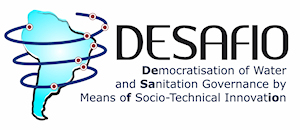DESAFIO produced 10 case study reports addressing eight experiences of socio-technical innovations designed to democratize the politics and management of water and sanitation services and tackle the situation of inequality affecting vulnerable communities. The innovations were implemented in Argentina, Brazil and Colombia over several decades. These experiences include from community-organized and managed systems of drinking water provision from spring sources dating back at least to the 1960s, to interventions to supply basic water and sanitation services implemented during the period of the research (2013-2015). The 10 reports cover 5 innovative solutions introduced in Brazil, 2 from Colombia, and 1 from Argentina. We provide below the links to the individual pages of each case study report.
All 10 reports are freely available as Working Papers in our Publications page.
Historical Cases
2.1 Political-Institutional Assessment of SISAR in Northeast Brazil
2.2 The Condominial Sanitation System in Zones of Special Social Interest (ZEIS) in Recife, Brazil
Current Cases
3.1 Ethnographic Assessment of the SISAR Model
3.3 Community Management of Rural Water and Associativism in Colombia
Intervention Cases
4.2 Community Oriented Water and Sanitation System in a Rural Community in North East Brazil
4.3 Capacity Building for Monitoring Water Quality in Vulnerable Communities in Argentina













